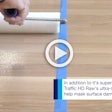The U.S. passed the Coronavirus Aid, Relief and Economic Security (CARES) Act March 27 in an attempt to bolster businesses during the economic downturn caused by the coronavirus crisis. The Act could offer needed relief for hardwood flooring companies and employees struggling during the pandemic. Here are answers from the U.S. Chamber of Commerce and the World Floor Covering Association to a few common questions about the Act in regards to wood floor pros:
Are self-employed and sole proprietors included?
Yes. Included in the legislation is the Paycheck Protection Program, which provides guaranteed loans for small businesses with fewer than 500 employees, including independent contractors and those who are self-employed or sole proprietors. No personal guarantee or collateral from applicants is required for the loan as long as the business was operational as of Feb. 15, 2020, according to the U.S. Chamber of Commerce.
What is the maximum loan amount?
The maximum loan amount for a small business is $10 million, with an interest rate no higher than 4%. Businesses can have all or some of the loans forgiven, provided, according to the Chamber of Commerce, “employers continue paying employees at normal levels during the eight weeks following the origination of the loan, then the amount they spent on payroll costs (excluding costs for any compensation above $100,000 annually), mortgage interest, rent payments and utility payments can be combined and that portion of the loan will be forgiven.”
What can the loans be used toward?
The loans can be used to pay the salaries of those who make under $100,000 per year, paid leave, group health care benefits including insurance premiums, retirement benefits and state or local taxes.
Are there other federal loan options?
The CARES Act also expanded eligibility for Economic Injury Disaster Loans, opening them to businesses with under 500 employees, including independent contractors and sole proprietors. The EIDLs can be approved based solely on the applicant’s credit score and loans smaller than $200,000 can be approved without a personal guarantee. The loan offers a $10,000 emergency grant advance that can be forgiven if it is spent on paid leave, maintaining payroll, increased costs due to supply chain disruption, mortgage or lease payments or repaying obligations that cannot be met due to revenue loss, according to the Chamber of Commerce. The grant can be paid to businesses within three days of applying for the loan, according to the World Floor Covering Association (WFCA). The can be applied for in addition with the Payment Protection Program loan, as long as they are not both going toward the same expenses.
Are there tax credit options?
The CARES Act also amended tax policies amid the crisis, making businesses eligible for an employee retention tax credit. To be eligible, business operations would have had to be fully or partially suspended due to a government shut-down order, or have suffered a loss of 50% or more in gross receipts compared with the same quarter in 2019. Eligible businesses can get a refundable 50% tax credit on wages up to $10,000 per employee, according to the Chamber of Commerce. The credit can be obtained on wages paid or incurred from March 13–Dec. 31, 2020, but ends the quarter after the business has gross receipts above 80% of those reported during the same quarter of the year prior. Businesses with 100 employees or less may apply the credit to all employees’ wages, according to WFCA.
Can payroll tax payments be delayed?
Yes. Businesses, including independent contractors, can defer payroll tax payments and pay them over the next two years, according to the Chamber of Commerce. Businesses must pay 50% of the taxes by the end of 2021 and the other 50% paid by the end of 2022. Deference of these taxes is not applicable to businesses that have a Paycheck Protection Program loan forgiven.



















